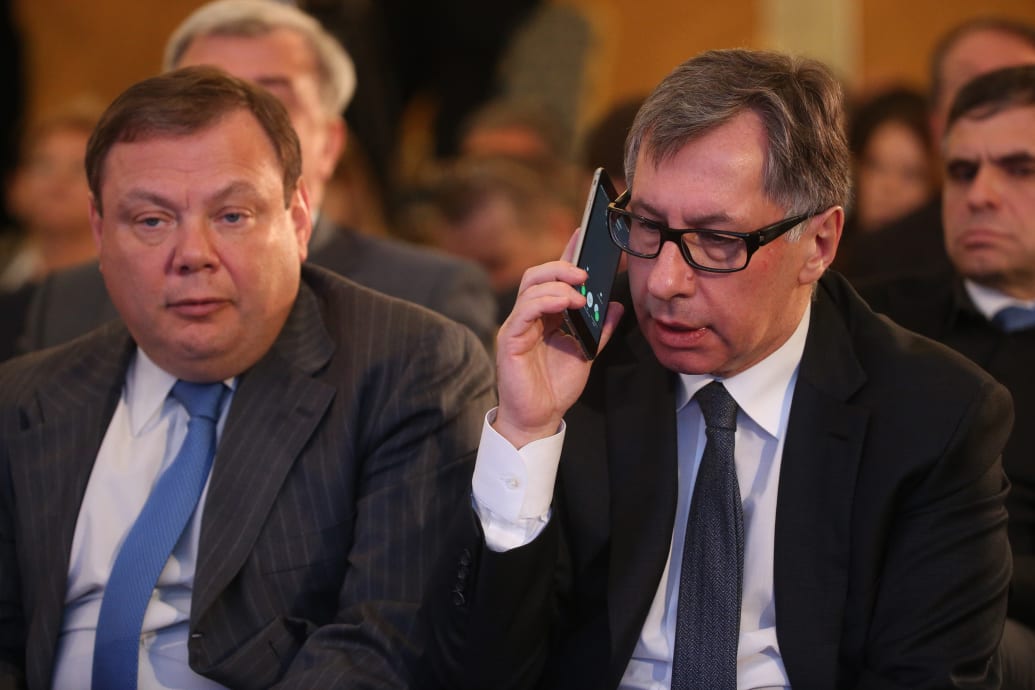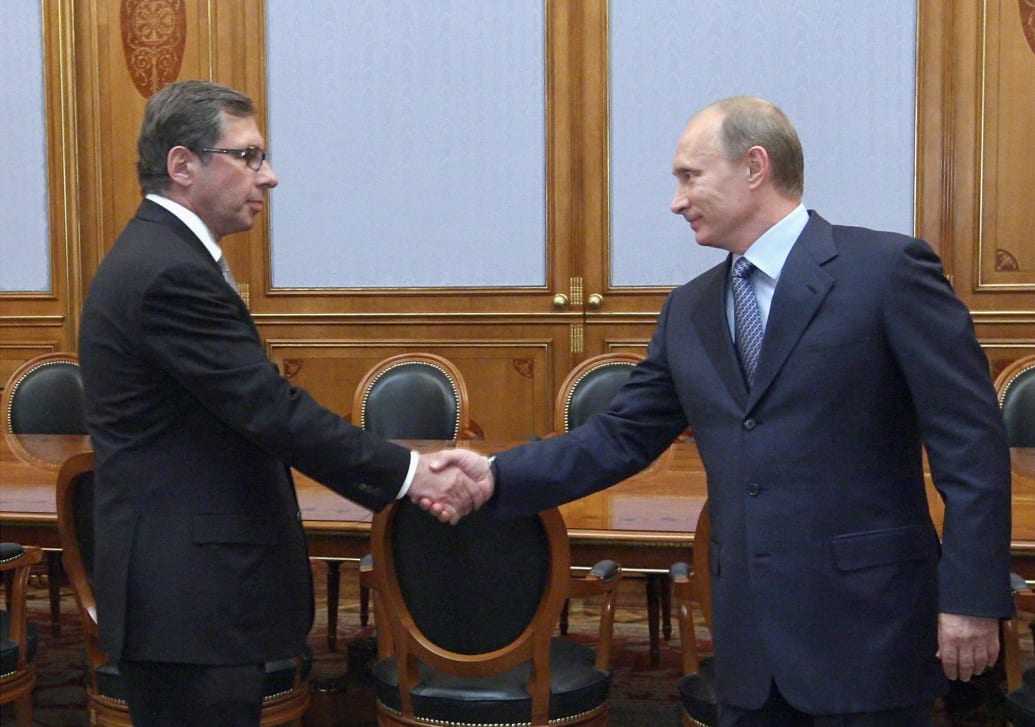Alex Constantine - January 14, 2024
As Western governments sanction Putin’s oligarchs and swoop down on their yachts in the wake of Russia’s Ukraine invasion, it is satisfying to know that these men are finally paying for their long enablement of Vladimir Putin. Although not directly involved in Putin’s decision-making, Russia’s oligarchs have been an indispensable part of Putin’s kleptocratic regime.
But there are two Putin buddies who—despite their known history of using the Kremlin for corrupt financial gain and their role in implementing Putin’s malign foreign policy agenda—have yet to be blacklisted by the U.S.: Alfa-Bank tycoons Petr Aven and Mikhail Fridman, who together have a net worth of over $17 billion.
RELATED: Adnan Khashoggi, the 1999 Moscow Apartment Bombings & the Rise of Putin
Washington’s reluctance to move against the two billionaires, who were sanctioned by the EU last month and by the U.K. on Tuesday, is difficult to explain. The men have pursued relentless lobbying campaigns and aggressive lawsuits in the U.S. for decades, serving not only their interests but also those of the Kremlin.

Russian billionaires and businessmen Mikhail Fridman (L) and Pyotr Aven (R) attend the plenary session of the Congress of Russian Union of Industrialists and Entrepreneurs (RSPP) on the sidelines of Russian Business Week in Moscow, Russia, March 16, 2017.
And yet, so far, Washington has only gone so far as to impose debt and equity restrictions on Alfa-Bank—Russia’s largest private bank—stopping short of sanctioning the oligarchs themselves, who resigned from the bank’s board of directors and its holding company a day after they were sanctioned by the EU in late February.
Aven’s close relationship with Putin dates back to 1991, when Putin was a deputy to the St. Petersburg mayor. As the minister of foreign trade at the time, Aven authorized Putin to dole out lucrative contracts for the export of oil and gas that were to be exchanged for food for starving St. Petersburg residents. The food never arrived, but the contractors, and Putin himself, made huge profits. Although Putin survived the scandal, Aven lost his job. Aven then joined Alfa-Bank—which was founded by Fridman—and became its president in 1994.
During the 1990s, as their business empire grew, Aven and Fridman were dogged by allegations, including from the FSB and the Russian parliament, of connections with organized crime, drug trafficking, and money laundering. In 2005, a United States district court in Washington, D.C. dismissed a 2000 libel suit filed by Fridman and Petr Aven against the Center for Public Integrity for repeating these allegations in an online article, noting that “plaintiffs no doubt have the wherewithal to respond to erroneous publications through persuasion rather than litigation.”
The two men were among the “seven bankers” who financed former Russian President Boris Yeltsin’s 1996 presidential campaign, and Aven, a long-time close friend of Kremlin insider Boris Berezovsky, even took part in high-level discussions over who should serve in Yeltsin’s new cabinet after the 1998 market crash. Alfa-Bank’s owners also contributed large sums of money to support Kremlin-favored candidates to the 1999 Duma elections, which helped ensure Putin’s victory in the March 2000 presidential race.
When Putin began cracking down on oligarchs in 2000, forcing Berezovsky to leave Russia, the former Alfa-Bank directors managed to remain in the Russian president’s good graces. According to Aven’s deposition for the 2000 libel suit, his and Fridman’s enterprise was “one of a handful of private financial companies with a special, direct line to the Kremlin.” Their friendly relations with Putin were helped by the advocacy of former Alfa-Bank deputy chairman Vladislav Surkov, who became a deputy head of Putin’s Presidential Administration and one of Putin’s top policy advisers. Aven was also a personal friend of Igor Sechin, Putin’s closest confidant.
Meanwhile, the bankers had begun establishing their image as “friendly oligarchs” in the U.S. In 2002, they hired the top Washington public relations firm BGR to pave their way into elite government and think-tank circles. That year, Aven spoke at the Carnegie Center in Washington, touting the Alfa Group conglomerate (which included oil and telecom companies, along with banking) and advocating for Russia’s entrance into the World Trade Organization (WTO).
The two Putin emissaries would become familiar faces on the Washington speaking circuit. In 2003, Fridman was honored with the Golden Plate Award of the International Academy of Achievement in Washington, presented by former U.S. President Bill Clinton. Alfa-Bank paid BGR close to $6 million for lobbying on behalf of “bilateral US-Russian relations” from 2004 to 2015.
Real estate tycoon Jack Rosen, president of the American Jewish Congress, became a hugely valuable connection for Alfa’s men, themselves active supporters of Jewish and Israeli causes. In 2007, Rosen joined the international advisory board of Altimo, Alfa Group’s telecom investment arm, and in 2012, he partnered with Fridman in a plan to buy up $1 billion in distressed properties along the east coast
Aven and Fridman also forged a relationship with Richard Burt, a former U.S. ambassador to Germany and founder of the lobbying firm McLarty Associates, which has represented the business interests of LetterOne, the bankers’ Luxembourg-based investment company. Burt, a former member of LetterOne’s advisory board, accompanied Fridman on visits to the White House in May 2010 and again in May 2011. According to Burt, Fridman’s goal was “to strengthen ties between the United States and Russia and to discuss Russian ascension to the World Trade Organization.” In April 2016, Burt helped to craft Trump’s first major foreign policy speech, which urged greater cooperation with Russia. And just after the 2016 elections, Aven asked Burt, unsuccessfully, for help in establishing a communications link between the Kremlin and the Trump transition team.
The lobbying raised the oligarchs’ stature. In November 2015, Aven received a prestigious Woodrow Wilson award in recognition of his contribution to improving U.S.-Russia relations. Coincidentally, Aven invited his friend Mikhail Lesin to attend the award dinner in his honor, but Lesin ended up dead in a Washington, D.C. hotel room. Lesin was Putin’s ex-press minister and founder of RT television in Russia. He was reportedly on the outs with Putin and about to have conversations with the FBI that week.
Unsurprisingly, Alfa-Bank’s former directors lobbied hard against the U.S. sanctioning of Russians because of the 2014 seizure of Crimea and 2016 election interference. (Their names appeared in the January 2018 U.S. Treasury list of Russians with close Kremlin ties.) In May 2018, the two “friendly oligarchs” were guests of honor at a dinner hosted by the Atlantic Council to discuss the Russian economy and sanctions. Among those attending were Clay Barry, deputy assistant secretary of the U.S. Treasury, and Joe Wang, director for Russia at the National Security Council.
That same year Fridman gave $1.25 million to the Kennedy Center for renovating a lounge. And in 2020, LetterOne paid the U.S. consulting firm Teneo over $1 million for advice on media strategy and help in arranging interviews.
But the bankers’ main focus was on litigation to discredit allegations in the Steele dossier about their closeness to Putin and their alleged bribery of him in the early ’90s. The litigation seemed like an overreaction: While the bribery claim was scurrilous, it was over 20 years old. And it was common knowledge in Washington that these men had Putin’s ear. Aven would even admit to Robert Mueller’s team in August 2018 that he was one of the oligarchs who met with Putin regularly and took implicit directives from him.

Vladimir Putin shakes hands with Pyotr Aven of Alfa-Bank, in Moscow on July 9, 2010.
Nonetheless, in 2017 and 2018, Alfa’s bankers, including co-founder German Khan, filed defamation suits in U.S. courts against Buzzfeed News, which had published the dossier; Fusion GPS, which had hired Christopher Steele to compile the dossier; and Steele himself. Although the cases against Buzzfeed and Steele have been dismissed, a Washington, D.C. court denied a motion by Fusion GPS to dismiss the case in January 2019, so it remains active.
Alfa-Bank’s litigiousness reached new heights in June 2020, when it filed lawsuits in Pennsylvania and Florida against unnamed “John Doe” defendants for supposedly fabricating internet server data (DNS lookups) to make it appear that Alfa-Bank had been covertly communicating with the Trump campaign in 2016. The story of the mysterious server communications had received a lot of media attention, but by this time, the FBI had reportedly found nothing suspicious, and the story had disappeared from the public’s radar. So why would Alfa-Bank open this can of worms?
Alfa-Bank enlisted the law firm Skadden, Arps to take the cases. The firm has a long history of representing Alfa-Bank’s men in their legal battles. German Khan’s son-in-law Alex van der Zwaan was one of their lawyers until he got caught lying to Mueller’s investigators about his work with Paul Manafort in Ukraine.
The complaint was far-fetched. It would have been virtually impossible to fabricate the four months of DNS lookups between the Trump server and Alfa-Bank. Also, the bank itself had always claimed that the communications resulted from an automated email-based campaign to market Trump properties to Alfa-Bank employees.
But the lawsuits not only forced dozens of scientists and policy advisers to hire lawyers; they also bolstered John Durham’s investigation into possible malfeasance by government investigators of Trump-Russia election collusion.
Durham was able, for example, to use an indictment of Michael Sussman, the lawyer who told the FBI about the server links, to discredit the suspicions computer scientists raised about the odd internet data. During a hearing related to Sussman’s indictment, the D.C. court judge observed that Durham’s statements and Alfa-Bank’s allegations were “almost written by the same people in the same way.”
A more sinister motive of Alfa-Bank may have been to gather information for the Kremlin on how cyberintelligence was collected. As journalist Marcy Wheeler hypothesized: “Rather than finding anyone to sue… [Alfa-Bank] has instead spent its time subpoenaing experts to learn as much as it can about how the U.S. tracks DNS records to prevent cyberattacks by—among other hostile countries—Russia.”
On March 4, with calls for sanctioning Russia’s oligarchs mounting, Alfa-Bank attorneys filed notices that their clients were dropping both the Pennsylvania and Florida complaints. We may never know for sure whether Alfa-Bank conspired with Trump to help him win the election. Whatever FBI investigators found, no innocuous explanation for the server communications has emerged. But Alfa’s two lawsuits, in revealing the convergence of the Durham report with the plaintiff’s allegations, make the collusion theory a lot more credible.
After Fridman and Aven were locked out of their company LetterOne in early March, Fridman sent a letter to LetterOne employees saying that “war can never be the answer,” and that “this crisis will cost lives and damage two nations who have been brothers for hundreds of years.”
But for many, these words are too little, too late. Fridman and Aven have spent years courting Putin as he murdered and persecuted political critics, suppressed democratic freedoms, and attempted to topple democratically elected governments on Russia’s borders. Why they’ve been spared from the onslaught of U.S. sanctions that have reduced other Russian oligarchs to tears remains a mystery.